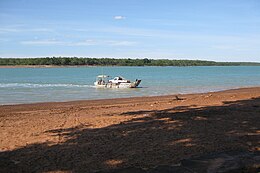This is an old revision of this page, as edited by Monkbot (talk | contribs) at 05:21, 26 September 2019 (→top: Task 16: replaced (1×) / removed (0×) deprecated |dead-url= and |deadurl= with |url-status=;). The present address (URL) is a permanent link to this revision, which may differ significantly from the current revision.
Revision as of 05:21, 26 September 2019 by Monkbot (talk | contribs) (→top: Task 16: replaced (1×) / removed (0×) deprecated |dead-url= and |deadurl= with |url-status=;)(diff) ← Previous revision | Latest revision (diff) | Newer revision → (diff)
| This article needs additional citations for verification. Please help improve this article by adding citations to reliable sources. Unsourced material may be challenged and removed. Find sources: "Melville Island" Northern Territory – news · newspapers · books · scholar · JSTOR (May 2019) (Learn how and when to remove this message) |
| Native name: (Tiwi) Yermalner | |
|---|---|
 Melville Island, viewed from Bathurst Island Melville Island, viewed from Bathurst Island | |
| Melville Island is an island in the eastern Timor Sea, off the coast of the Northern Territory, Australia. | |
| Geography | |
| Location | Timor Sea |
| Coordinates | 11°33′S 130°56′E / 11.550°S 130.933°E / -11.550; 130.933 |
| Archipelago | Tiwi Islands |
| Major islands | Melville, Irrititu |
| Area | 5,786 km (2,234 sq mi) |
| Administration | |
| Australia | |
| Territory | Northern Territory |
| Largest settlement | Milikapiti (pop. 559) |
| Demographics | |
| Population | ca. 1030 |
| Ethnic groups | Tiwi |
Melville Island (Tiwi: Yermalner), known in the Tiwi language as Yermalner, is an island in the eastern Timor Sea, off the coast of the Northern Territory, Australia. It has a tropical climate, being west of the Cobourg Peninsula in Arnhem Land and north of Darwin.
The largest settlement on the island is Milikapiti, with a population of 559. The second largest is Pirlangimpi (Pularumpi, formerly Garden Point), with a population of 440, located 27 km (17 mi) west of Milikapiti, on the west coast of Melville Island. About 30 more people live in five family outstations.
At 5,786 square kilometres (2,234 sq mi) it is just outside the 100 largest islands in the world, but is the second biggest island in Australia, after Tasmania (and excluding the continental landmass). Only 55 metres (180 ft) south of its southern tip is Irrititu Island, with an area of 1.60 square kilometres (0.62 sq mi).
Together, Melville Island, Bathurst Island and nine smaller uninhabited islands are known as the Tiwi Islands.
It is said that the first European to sight the island was Abel Tasman in 1644. Explorer Phillip Parker King (son of governor of New South Wales Philip Gidley King) named it for Robert Dundas, 2nd Viscount Melville, first lord of the Admiralty, who is also commemorated by the much larger Melville Island in the Canadian Arctic Archipelago. Shortly after this, the British made the first attempt to settle Australia's north coast, at the short-lived Fort Dundas.
During World War II the small Snake Bay Patrol manned by local Indigenous Australians was established as part of the military forces deployed to protect the island against any Japanese landings.
See also
References
- John Woinarski; Brooke Rankmore; Alaric Fisher; Kym Brennan; Damian Milne (December 1997). "The natural occurrence of northern quolls Dasyurus hallucatus on islands of the Northern Territory: assessment of refuges from the threat posed by cane toads Bufo marinus" (PDF). Australian Government and Northern Territory Government. p. 16. Archived from the original (PDF) on 10 April 2011. Retrieved 30 May 2011.
- Hart, C. W. (July 1930). "The Tiwi of Melville and Bathurst Islands". Oceania. 1 (2): 167–180. JSTOR 40327319.
{{cite journal}}: Invalid|ref=harv(help)
External links
| Islands of the Northern Territory | |
|---|---|